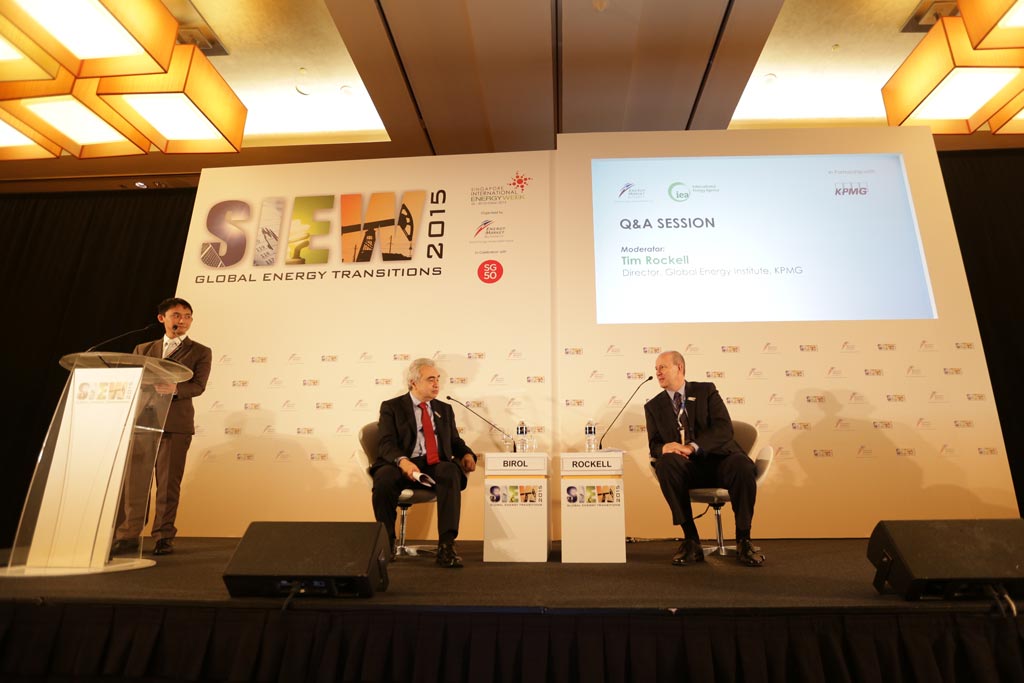
Dr Fatih Birol, Executive Director of IEA, discusses Southeast Asia's energy outlook with Tim Rockell, Director of the Global Energy Institute at KPMG
By Koh Hui-Shan
Southeast Asia will continue to be a major player in global energy markets until at least 2040, with coal taking on a far bigger role than natural gas as the fuel for power plants in the region, Dr Fatih Birol, executive director of the International Energy Agency, said on Tuesday at Singapore International Energy Week 2015.
The IEA projects the region’s collective energy demand will rise 80% to more than 1,000 million tonnes of oil equivalent by 2040.
“Electricity demand is tripling in Southeast Asia, showing the importance of the region’s choices for the rest of the world,” Birol said. “A stable policy landscape and greater regional cooperation are critical for balancing the region’s energy, economic and environmental policy objectives.”
He said Southeast Asia’s “oil consumption is increasing significantly because of increasing car ownership mainly” and – given the region’s oil production is on a downward trend – more should be done to improve fuel efficiency.
With coal being 70% cheaper than gas for each kilowatt hour of electricity generated, Birol said “coal will be the number one fuel in the energy mix in ASEAN countries” and that China and India’s coal policies will have an impact on the supply to Southeast Asia.
In 2040, more than half of coal-fired generation capacity in Southeast Asia is expected to be comprised of subcritical technologies that are less efficient and generate more carbon emissions than supercritical and ultra-supercritical power plants, he said.
“This is the only place in the world where coal’s share of the energy mix is increasing and that has huge implications,” Birol said.
Investors will be happy about the projected high energy and electricity demand in the region, he said, but the IEA, governments and environmentalists are concerned about the rise in emissions and pollution, as well as sustainability.
To raise environmental ambitions, the IEA calls on governments to embark on a “bridge scenario” strategy to mitigate the rise in energy demand and emissions without harming economic growth by:
- Increasing energy efficiency in the industrial, construction and transport sectors
- Increasing investment in renewable energy technologies
- Reducing the use of the least-efficient coal-fired power plants and eventually impose a ban on their construction
- Reducing methane emissions in upstream oil and gas production
- Gradually phasing out consumer fossil fuel subsidies
Birol said the IEA is committed to strengthening engagement with Southeast Asian countries to improve their economic and environmental energy objectives on the road to a more sustainable system. The IEA has chosen Singapore as a new hub to release its reports, such as the Medium-Term Coal Market Report that will be launched in December.
About Singapore International Energy Week (SIEW)
In its 8th edition, Singapore International Energy Week is the premier platform in Asia for energy insights, partnerships and dialogue, bringing together the world’s leading conferences, exhibitions and roundtables in one week and one location. SIEW enriches the global energy conversation by convening political, business, academic and energy industry thought-leaders to define and advance the world’s energy challenges, solutions and actions across the spectrum of oil and gas, clean and renewable energy, and energy infrastructure financing.
Please visit www.siew.gov.sg for more information.
About the Energy Market Authority
The Energy Market Authority (EMA) is a statutory board under Singapore’s Ministry of Trade and Industry. Our main goals are to ensure a reliable and secure energy supply, promote effective competition in the energy market and develop a dynamic energy sector in Singapore. Through our work, we seek to forge a progressive energy landscape for sustained growth.
Please visit www.ema.gov.sg for more information.